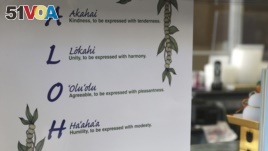21 April, 2019
Is it possible for a business to legally own a word from a native culture and prevent its use by members of the native community?
This question is being considered in the American state of Hawaii. Some Hawaiians were surprised to learn that an American company had trademarked a business name that includes "aloha" -- one of the most common native Hawaiian words.
The Chicago-based eatery's full name is "Aloha Poke."
Aloha is a native Hawaiian word commonly used as a friendly greeting. It can also mean love or kindness and is used by Native Hawaiians and others to describe the way of life in Hawaii.
The word "poke" is a traditional Hawaiian salad usually made from pieces of fish, rice and vegetables. American restaurants offering poke meals have increased in popularity in recent years.

This Tuesday, April 16, 2019 photo shows a sign inside Aloha Poke Shop, in Honolulu, Hawaii that explains 'aloha.' (AP Photo/Audrey McAvoy)
Aloha Poke Company operates restaurants in several American cities. The company has sent letters to some other businesses that it discovered were using poke and aloha in their names. The letters stated that Aloha Poke was a trademarked name. It demanded that other businesses stop using the words or face legal action.
One of the targeted businesses was Aloha Poke Shop in Honolulu, Hawaii's capital. Business co-owner Jeff Sampson told Hawaii's News Now that at first, he thought the letter must be a joke. "Because I didn't think you could trademark 'aloha' or 'poke' or them together in any shape or form."
Sampson said he ended up ignoring the letter after contacting lawyers and deciding that making a name change or launching a legal effort would be too costly for his business.
Sampson told the Associated Press he also explained to Aloha Poke Company that his Hawaii-based restaurant should not be considered a threat because it was too far away from the U.S. mainland.
Jarrett Keohokalole is a Native Hawaiian state senator. He said he was shocked "at the audacity of people from outside of our community" who seemed to be trying to prevent the use of "symbols and words that are important to our culture."
Aloha Poke Company issued a statement to Hawaii's News Now explaining its position. In the statement, business chief Chris Birkinshaw denied that his company had attempted to "own" the words aloha or poke.
However, he said the company does hold two federal trademarks for its company design logo and the words "Aloha Poke" for use with its restaurant business. The statement added that this gives the company the "exclusive right to use those words together in connection with restaurant services within the U.S."
The legal fight over Aloha Poke has increased publicity about a plan by some lawmakers in Hawaii to seek new legal measures that would protect Native Hawaiian cultural intellectual property.
A legislative proposal calls on Hawaiian state agencies and Native Hawaiian organizations to form a group to study legal ways to "recognize and protect" such property. If approved, the group would provide its legislative suggestions within three years.
I'm Bryan Lynn.
The Associated Press reported on this story. Bryan Lynn adapted it for VOA Learning English, with additional material from Hawaii News Now. Ashley Thompson was the editor.
We want to hear from you. Write to us in the Comments section, and visit 51VOA.COM.
______________________________________________________________
Words in This Story
trademark – v. secure an official registration for ownership of a product or idea
greeting – n. something friendly people say to each other when they meet
audacity – adj. showing too much confidence in one's own behavior in a way that other people find shocking or rude
symbol – n. a sign or object used to represent something
logo – n. design or symbol used by a company to advertise its products
exclusive – adj. not shared with other people or organizations
intellectual property – n. something such as an idea, invention or process that comes from a person's mind